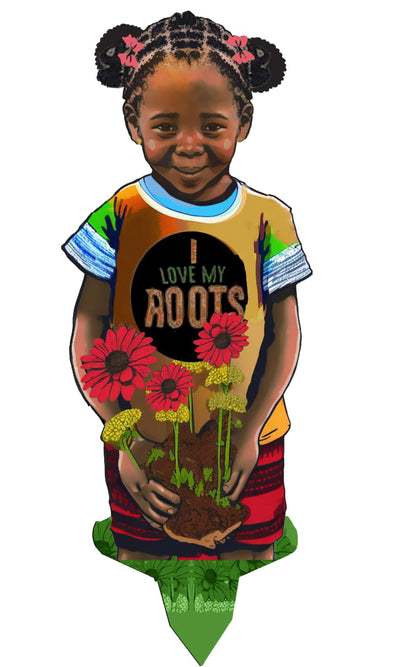Rushemeza, Duhirwe (The Darkest Hour Is Just Before Dawn)
Rushemeza, Duhirwe (The Darkest Hour Is Just Before Dawn)
"The Darkest Hour Is Just Before Dawn" by Duhirwe Rushemeza
37.5 x 47 inches linocut on paper, (2006) -- framed

Duhirwe Rushemeza has had an extensive career in the United States as well as in her home country of Rwanda. Her work has been included in exhibitions at the Harlem School of the Arts, Museum of Contemporary African Diasporan Art, Brooklyn; The Museum of Science and Industry, Chicago, IL; and in Florence, Italy, among many others. She is in the permanent collections of the Embassy of Rwanda, Washington, DC; Embassy of the United States, Kigali, Rwanda; and the collections of Oprah Winfrey and James Cuno, director, Art Institute of Chicago. She has been an artist in residence at the Harlem School of the Arts and the Robert Blackburn Printmaking Workshop and was project coordinator for the Field Museum, Chicago.
Duhirwe Rushemeza and family were affected by the 1994 Genocide that claimed the lives of close to one million over a three month period as the majority of the world watched indifferently. Shortly after the genocide, Rushemeza went to Rwanda. It was her first trip there since childhood, and she felt touched by the plethora of orphaned children, roaming the streets alone and homeless withnowhere to turn. That experience gave her an introspective journey with her work that inspired a series of pieces portraying Rwandans who were victims – indeed, survivors – of war crime. The series focuses on emotional trials, their healing, and their strength. There is sadness, hope, love and beauty in each piece.
"For me, cutting into linoleum has become a meditative journey, one I want to share with anyone who views my work. In my own healing, I have expanded my collection to include storytelling by the ancient Lukasa divination boards used by the Luba people Rwanda as memory boards. In each relief woodcarving, studded by intricate use of shells and beadwork, a new story is told, one that can be interpreted by the marker of the board or the viewer. As we, African people, Diasporas and human people, continue healing from strife in Rwanda, in Congo in countries of a resource- rich Continent, the story telling memory boards are used as much to represent a specific story as to inspire new ones."
- Secure payments
- Low stock - 1 item left
- Inventory on the way






































